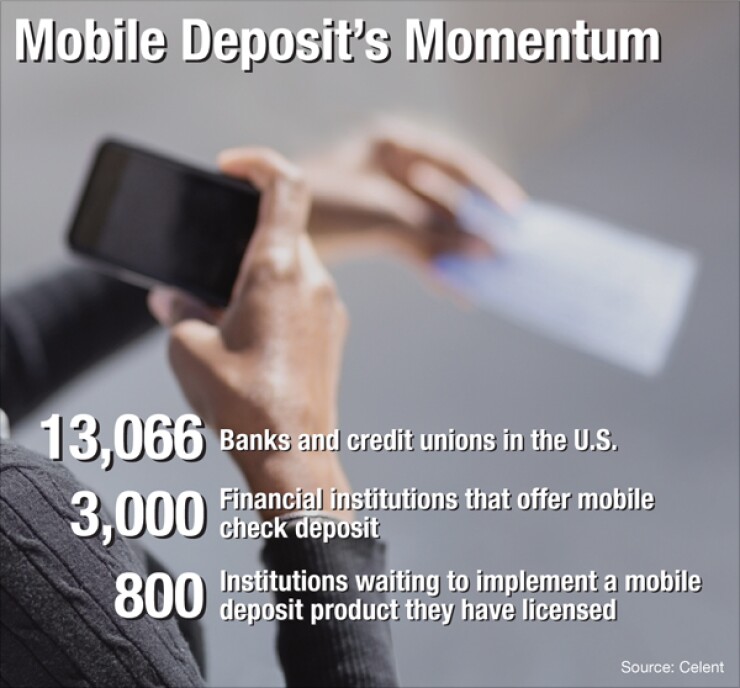-
While "double-dipping" fraud is reportedly rare, vendors want to stay ahead of a problem and help bankers feel comfortable raising deposit limits and expanding the user base for mobile deposit.
November 4 -
Mobile check deposit, once a low priority technology for banks, has become one of the most sought out mobile banking app features. But along with popularity and increased use, the potential for fraud is emerging.
July 11

For such a time-saving product, mobile deposit capture could be a slowpoke.
It sometimes took a long time for interested customers to receive permission from their banks to deposit checks with their smartphones. And when customers did get the OK, transactions deemed suspicious were slow to go through. Security concerns and other practical factors were to blame.
"We had very tight controls," said Daniel Dent, the senior vice president of consumer deposits and emerging payments at First Tennessee Bank. "It was almost an inconvenience to the customer at times."
Yet things are changing at the 150-plus-year-old Memphis bank, like at many of its peers, because of competition, technological advances and growing comfort levels among bankers and consumers.
In 2012, First Tennessee customers sometimes had to wait a year before they could earn permission to use mobile deposit capture. Today, new customers can use the feature right away.
The product has built momentum nationwide. About 3,000 banks and credit unions offer mobile deposit capture, and the research and consulting firm Celent estimates that 800 financial institutions have licensed the product and are waiting to implement it.
There were, and in some cases still are, many hurdles in the way.
Beyond the potential long wait time to use the product, transaction processing could be slow. First Tennessee and other institutions sought lower fraud risks with daily deposit limits and holds that could be prolonged because of the manual review that was necessary for suspicious transactions.
There were good reasons for the precautions. Bank officials were worried that depositors could sneak through checks from closed accounts, or that some might try to redeposit the same check several times.
But something had to give as rivals made the product widely available and customers demanded a loosening of the restrictions. First Tennessee updated its technology so that it could flag dubious transactions earlier than in the past, and it has been pleased with the results.
Fraud rates have been low industrywide, and banks are emboldened to experiment with new features.
Shirley Inscoe, a senior analyst with the consulting and research firm Aite Group, said some banks are starting to loosen their controls given the heavy demand, low incidences of fraud and the opportunity for cost savings.
Of course, there have been some growing pains. One of the banks Inscoe interviewed for an upcoming report shortened how long customers had to wait to use the product and then lengthened it again after an uptick in fraud, she said.
Banks are going to have to be ready in case criminals up their game, too. As the U.S. shifts to
"The fraud has to go somewhere else," Inscoe said."Bad guys won't say 'Oh well, I will go get a day job.'"
And as more banks make mobile deposit capture available, they will need to balance convenience and security. The challenge is to get ahead of a problem without applying a one-size-fits-all approach that could make what is supposed to be an easy transaction become complicated.
Background Check
First Tennessee expanded the scope of customers who could use the feature to improve the customer experience and reduce its manual review.
It began piloting technology that came from a pairing of two companies specializing in mitigating risk: Ensenta and Early Warning Services. Ensenta, which scouts for risk factors like duplicate presentment, helped First Tennessee incorporate more safeguards in the FIS mobile technology it runs.
Ensenta added risk factors that would trigger checks to be sent on to Early Warning at the moment the person is depositing it, if need be. In cases of say, a high deposit amount, Ensenta will shoot over the suspect check to Early Warning. Early Warning, a bank-owned organization that shares deposit data to fight fraud, then determines whether the suspect check was written on an open or closed account and conducts other reviews.
The goal is to spot issues earlier in the process.
"The sooner you catch the fraud, the better off you are," said Jim Ballagh, vice president of business development at Ensenta.
And the added precautions have helped First Tennessee eliminate much of the manual work that took time and irritated customers with longer holds.
The numbers tell the story. The bank's mobile deposits rose about 68% in December from a year earlier as it works to continue to simplify banking tasks.
"People are busy," Dent said. "Our goal is to be easy to do business with."





